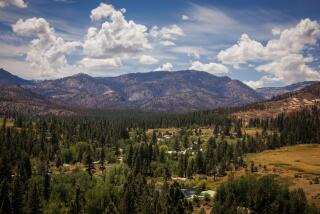‘Code’ lets newcomers in on realities of rural life
- Share via
WENATCHEE, Wash. — When Californians Dave and Laurie Schmidt moved to Montana in the 1980s, they knew the dirt road to their cabin, a route that takes visitors over a river and through a ghost town, would disappear under mounds of snow for months every year.
They knew there’d be no curbside trash or recycling pickup and that they’d probably have to drive several miles on rutted country roads to pick up their mail. But that’s what the adventurous couple wanted -- and that’s what they got.
So they were surprised when some of their neighbors, recent arrivals from distant cities who had purchased 20-acre ranchettes with dreams of a quiet, rural existence, started to complain about the absence of such amenities.
“They thought that if they bought the land, someone would bring the services to them,” said Laurie Schmidt, who with her husband manages Wade Lake Cabins resort, 30 miles west of Yellowstone National Park. “They figured the county was going to take care of it.”
But rather than bash the newcomers for their city-slicker naivete, Schmidt and friends decided to educate them; let them in on time-tested country-living maxims such as “cows smell,” “snowstorms happen” and “dirt roads wash out.”
The concept of a modern-day Code of the West -- based on the kind of cowboy common sense made popular by Western writer Zane Grey -- is catching on in Colorado, Idaho and Arizona. Most recently, Chelan County in Washington adopted its own code, which has been distributed at the town hall.
Grey, who wrote about hardy, self-reliant men and women on America’s Western frontier, romanticized a code that warned one cowboy not to try on another’s hat. The new pamphlets explain that cattle may have the run of the land unless you fence them out, cell phone service may be iffy and potholes may prove hazardous to luxury SUVs.
“Some people think that we are trying to deter people from locating in Chelan County,” said Buell Hawkins, a tractor salesman and chairman of the Chelan County Commission. “But that’s not the case. We are trying to make people aware of what they should expect.”
Chelan County, nestled at the base of the Cascade Mountains and about 96 miles east of Seattle, is probably best known for its apple, peach and cherry orchards. Enchanted by the region’s bucolic setting and stunning mountain vistas, more and more visitors are returning to build showcase homes. Indeed, with a population of about 58,000, Chelan County is one of the fastest-growing areas in Washington, attracting urban professionals yearning to escape city stress. But this surge of growth has not come without some growing pains, said Hawkins, referring to newcomers who whine about the poor conditions of roads, unreliable septic systems, the noisy drone of orchard machinery and the foul odor of agricultural pesticides.
“I get calls from people who say, ‘I need you to do something about this wind machine,’ ” said Hawkins, referring to machines that circulate air to keep fruit from freezing. “ ‘It goes off every morning and I am trying to sleep.’ ”
Chelan County’s Code of the West -- E. John Clarke, a former elected official from Larimer County, Colo., wrote the first one in 1995 -- includes helpful hints about the risks of building in a forest (wildfires are unpredictable and devastating) or on a steep slope (rockslides could reduce your dream home to a pile of sticks.)
The Chelan County code also includes tips for dealing with rattlesnakes and mountain lions, as well as a warning to animal-rights activists that “hunting is a tool for managing wildlife populations. It also involves individuals who may trespass, litter and fire guns. Don’t assume your property is in a no-shooting zone.”
So far, response to the code has been positive, Hawkins said, even among real estate agents, some of whom make a living selling large expanses of forested land to wide-eyed settlers.
“One can’t have a city perspective and survive in a rural environment,” said Kathy Emerick of Windermere Real Estate in Chelan County. “The Code of the West does place an awareness on the buyer to do their due diligence. To ask questions like, ‘Is there going to be power there? How will I get water?’ ”
Lynn Anderson is a reporter for the Baltimore Sun, a Tribune company.
More to Read
Sign up for Essential California
The most important California stories and recommendations in your inbox every morning.
You may occasionally receive promotional content from the Los Angeles Times.













